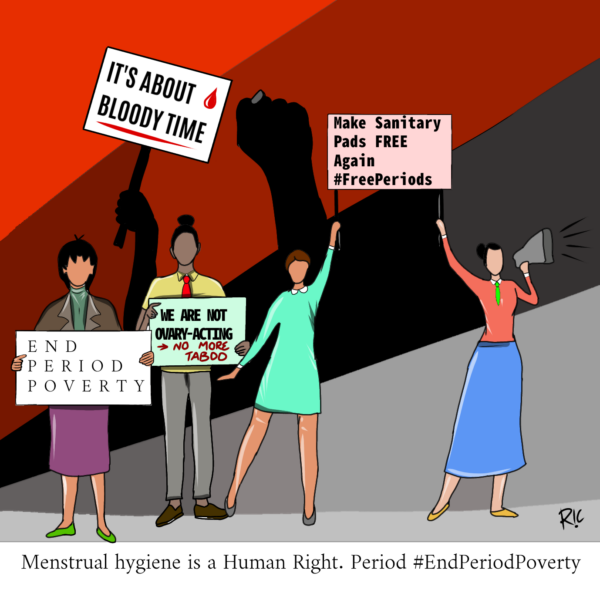
Illustration by Eric Muhandia
Article By Jane Beatrice Obila
Menstrual hygiene is the process of ensuring general cleanliness amongst women when they are discharging blood and other materials from the lining of the uterus every month. A joint 2012 monitoring Programme conducted by World Health Organization (WHO) and United Nations International Children’s Fund (UNICEF) defines it as the act of using clean menstrual materials to collect menstrual blood, using soap and water to wash the body, and having safe and convenient facilities to dispose of the used menstrual material.
Many people have been fighting for women especially those from low-income communities to have free access to sanitary towels but the hygienic part is inadequately acknowledged putting the lives of adolescent girls and women at risk.
We should ensure that the information about how and why women need to take care of themselves by maintaining hygiene reaches all corners of the country as this will help in the prevention of infections, reduce odors, and enable women to stay comfortable during that period of the month.
Some of the people undergoing menstruation don’t bathe or wash their body even once a day because of the lack of information making others isolate them hence, low self-esteem. By educating those, such cases will-reduce
Menstrual hygiene is important as it helps in the prevention of various diseases that can even lead to infertility. According to World Bank Organization, unhygienic menstrual practices are harmful to those undergoing the process as they are at a greater risk of being infected with reproductive tract infections and pelvic inflammatory diseases.
Building disposal places in public places such as latrines and putting containers inside them for women to easily dispose of the used menstrual materials is essential as this will help in the prevention of other diseases such as cholera could break because of uncleanliness. According to UNICEF, 2.3 billion people lack basic sanitation services globally and in the least developed countries, only 27 percent of the population have handwashing facilities with water and soap as an indicator that many lives are at risk.
People have discouraged women from using unsafe materials such as unsterilized cloths for absorption of menstrual blood because of the dangers they portray and forgetting to educate them that even overstaying with the ‘safe’ materials is a danger to their lives.
Let’s normalize educating our girls and mothers on the importance of menstrual hygiene for their safety and also make them free from reproductive diseases.


